Arkwright Engineering Scholarships 2025
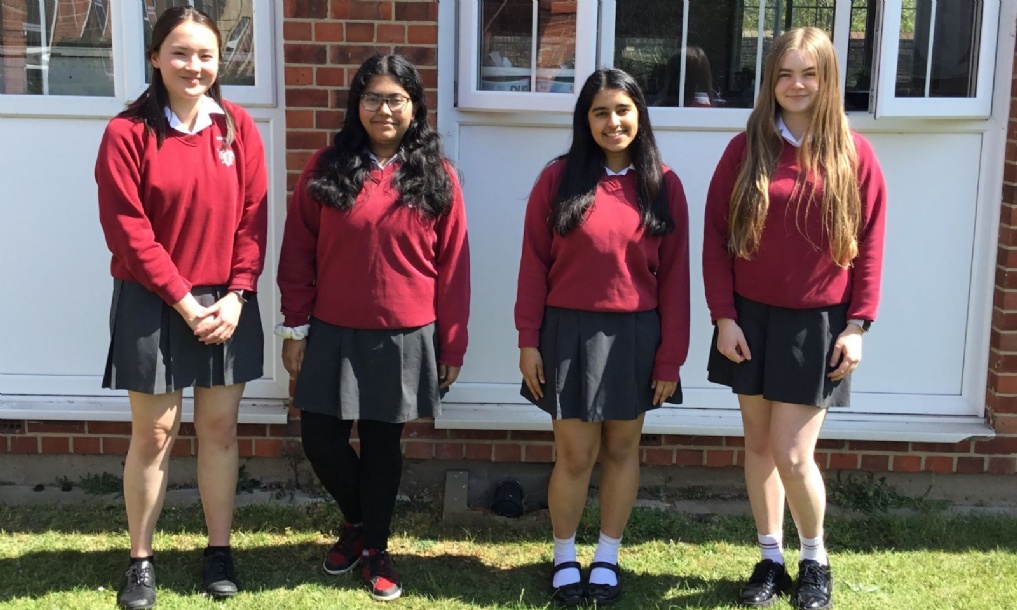
The Arkwright Engineering Scholarship is the UK’s most prestigious scholarship of its kind, designed to inspire and support the next generation of engineering leaders. The scholarship is awarded through a rigorous selection process to Year 11 students.
Administered by the Smallpeice Trust (the UK’s largest STEM educational charity) and supported by external sponsors, the two-year scholarship provides a range of opportunities, including:
- Hands-on work experience
- Support for curriculum projects
- A personal mentor for academic and career guidance
Arkwright offers two types of scholarships: a virtual scholarship and an externally funded scholarship. As part of the 'Application and Selection Process', interested Year 11 students are required to apply and present their ideas internally. Selected candidates then proceed through the following stages:
- Online application (endorsed by a teacher)
- Online aptitude exam
- A 30-minute online interview (for those successful in stage 2)
- Awarding of the Arkwright Engineering Scholarship
- Matching to a sponsoring organisation or awarding a Virtual Scholarship if no match is possible
Kendrick School is proud to be affiliated with the programme, allowing students to apply without the usual £45 administration fee, which is covered by the school fund. This year, out of nine applicants from Kendrick School, five students progressed to the aptitude test, and four were ultimately awarded scholarships. The final confirmation of whether scholars are awarded a virtual or externally funded scholarship is received in September 2025.
Many congratulations to the four successful applicants, Vidushi, Sophie, Ananya and Isabelle, who have shared their experience of applying for the scholarship with details of their ideas.
Vidushi's Journey
At the start of Year 11 in October 2024, we were presented with a wonderful opportunity to apply for the Arkwright Scholarship, a prestigious engineering scholarship for budding engineers. A Sixth Form student who had also been awarded the scholarship gave us a talk about the process. As I listened to the talk, I was inspired, and I knew I was going to apply.
The first step was to present an idea to Mrs Siera and Miss Brown. I started by brainstorming problems in the world because I wanted to solve an issue that would be useful for generations to come. Eventually, after pitching some of my ideas to my family and using their feedback, I landed on my final idea - a Real-Time Internet of Things (IoT) Water Quality Monitor. I wanted to combine my passion for engineering with my love for the environment and create something that could make a difference.
I presented my idea to some students, Mrs Siera and Miss Brown. They gave me very valuable advice and feedback, and I was later informed I could move forward to the next stage of the application. The application focused on our passion for engineering. I wanted to use my creativity to solve real world problems and build a better future. I also talked about my aspirations to study engineering at university, ideally at Cambridge. They also asked where I could see myself in 10 years, and I wrote about my hopes to work on projects that challenge me and that I am passionate about where I can bring prototypes to life and design innovative devices that benefit the world.
Many of the questions were about leadership. I thought back to my experiences in public speaking, as well as being part of the school council and a dancer. These experiences helped build my confidence. In the application, we were also asked what inspired us to pursue engineering, which I felt was the most important part. For me, it all started at a 'Kids at Work' event I attended when I was younger. I saw engineers working on things like AI face recognition and 3D printing, and I was fascinated by their ability to solve complex problems. That was the moment I realised that I wanted to be an engineer.
After submitting my application, I had to complete an aptitude assessment, which tested mathematical skills, problem-solving, engineering logic, and non-verbal reasoning. Although it was intense and time-bound, I stayed focused and tried my best. Now all I had to do was wait.
A month later, I found out I had made it to the final stage, which was the interview. I was elated as this was an amazing opportunity! I could not wait to start building my project for the presentation. I started by building my skills and creating small, simple circuits, like light bulbs with switches and resistors. Slowly, I began integrating humidity and temperature sensors, which were vital for my project. I also taught myself C++ coding to integrate and make it all work.
This is what my final project looked like while I was testing it with different water conditions - such as salty (many totally dissolved solids - TDS), or with hot water. This was to ultimately save marine life from all the impurities in the water which harm their habitats and ultimately kill them. It was such a fun process! Once my prototype was ready and the code was connected to the cloud, I put together a presentation and began preparing for the interview. I practised answering questions I expected, such as," Why do you want to be an engineer?", "What inspired your project?" I was now ready for the interview.
Although I was nervous, the interview ended up being a really relaxed and enjoyable conversation. I spoke to two graduate engineers, and they asked me about my project, my passion for engineering, my future study plans, and even what kind of apprenticeships I might consider. I spoke about my involvement in many UKMT Maths challenges, as well as the work experience opportunities I had at Wood Plc and Siemens.
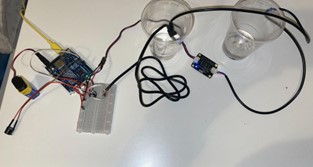 I presented my project and shared my diagrams and photos of my final project, as well as the smaller ones I made along the way. I discussed how I’d built everything from scratch and, if I could do it again, what I would improve. Although I stumbled at one point during my presentation, I kept going and stayed calm.
I presented my project and shared my diagrams and photos of my final project, as well as the smaller ones I made along the way. I discussed how I’d built everything from scratch and, if I could do it again, what I would improve. Although I stumbled at one point during my presentation, I kept going and stayed calm.
They also asked about leadership and gave me a scenario where I was a leader to see how I would solve problems in that role. I used my experiences to explain how I’d lead a team while also listening and learning from others. At the end, I asked them about their own experiences. One of them worked in the RAF, which was super inspiring, and the other used Arduino and Raspberry Pi, just like me.
Last week, during a Physics lesson, Mrs Sheppard announced that I had officially been awarded the Arkwright Engineering Scholarship! This was an incredible moment, and all my classmates were very supportive and proud. I'm so thankful to Mrs Sheppard, Mrs Siera, Miss Brown, and the entire Physics department for supporting and helping me throughout this journey.
I’m so happy that I applied for this process, as it was an amazing opportunity that I will carry forward with me forever. As an Arkwright Scholar, I will receive mentorship, funding, and opportunities to work with professionals in the engineering world. I'm so excited about this new opportunity to build connections and open more doors.
- Vidushi
Sophie's Story
At the end of 2024, me and a few others applied for the opportunity of winning an Arkwright scholarship. This is a prestigious award in the UK for students in Year 11 wishing to embark on engineering studies. As soon as I heard about it, I knew I wanted to apply. Maths and Physics are my favourite subjects, so for a while I had been researching a career in engineering and knew this would deepen my understanding, and also open me up to the world of work. Through a long process of applying, I discovered I had been awarded one of the scholarships and am so excited to increase my connections and showcase my skills to others.
It all began with thinking of a project to present to Mrs Siera and Miss Brown. I remember discussing with my mum and her friend, trying to come up with ideas that would be fitting for an impressive project. At that time, it was nearing winter, so I put a few of my favourite things together that resulted in creating a sustainable Christmas lights circuit which was solely powered by the wind and also a rechargeable battery if needed.
If the teachers considered you successful, they put you forward for the next round, which was the application process. I had to fill in this application form telling them all about myself, from playing in my school's netball team to wanting to study electronics and electrical engineering at Cambridge university. I also had to fill in details about my project and how I think it would help people. 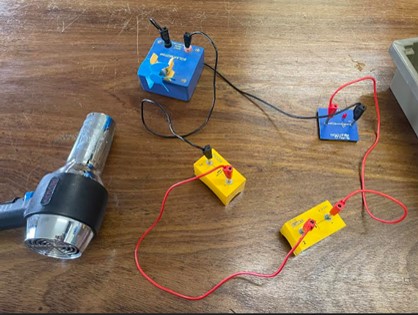 It had to include details about the design elements and what influenced you to create it. After my application got accepted, I sat an online aptitude test which tested me on my structural engineering, mechanical engineering, maths and non-verbal reasoning skills. It was very tight for time and put my maths and physics skills to the test. A week or so after the test, I received an email saying I had been awarded an interview! I was absolutely over the moon as I knew it was a tough competition and that it would be the final round before discovering whether I had received the scholarship!
It had to include details about the design elements and what influenced you to create it. After my application got accepted, I sat an online aptitude test which tested me on my structural engineering, mechanical engineering, maths and non-verbal reasoning skills. It was very tight for time and put my maths and physics skills to the test. A week or so after the test, I received an email saying I had been awarded an interview! I was absolutely over the moon as I knew it was a tough competition and that it would be the final round before discovering whether I had received the scholarship!
To prepare for my interview, I worked on my project in the back of the Physics lab, P2, during break time and before school, and also tweaked my presentation for a more updated version. I created a cost list to build my project on a small scale but also for commercial use as well. I also did research into wind speed in the UK and what sort of materials would be best for picking up the most wind and powering my project. To further improve my circuit, I worked out that I could use waste water from drain pipes as a way to power my circuit using hydroelectricity if there was little wind that day and more rain.
I explained this to my interviewers whilst discussing the other features. The interviewers were very relaxed and friendly. They wanted to get to know me as a person, which made the interview nowhere near as stressful as I thought it would be. I was also able to talk about my hobbies, and how my love for engineering has developed since I was a little girl, playing with an ‘electrosnaps’ circuit set. One of my interviewers was an old Arkwright scholar, whilst the other one served in the RAF and worked with an air cadets unit. We had this in common as I am a member of the RAF at CCF, and we were able to share our love for planes. After taking them through my project, they asked a few questions about me and what inspired me to create my project. They also wanted me to explain how some components worked, which I explained to them. I did have a mind blank about the function of a diode, but we swiftly moved past that!
Last week, during a Physics lesson, Mrs Sheppard started a random drum roll, encouraging the class to join in. As I joined in sharing the same confused look as others, Mrs Sheppard announced there was an Arkwright Scholar present in the room with us and proceeded to congratulate me in front of everyone! This was a spectacular moment in which I was overjoyed.
I am so very grateful for all her support alongside Miss Brown, Ms Haynes and Mrs Siera. Thank you very much for this wonderful opportunity and for guiding me along the way. I have all my thanks dedicated to you for my love for physics and encouraging me to work with it in the future!
- Sophie
Ananya's Journey
In late 2024, our year group had the opportunity to apply for the prestigious Arkwright Scholarship—a chance for students passionate about engineering, computing, and problem-solving to demonstrate their skills in tackling real-world challenges. The moment I heard about it, I knew I had to apply. With plans to study maths, physics, and computer science, this scholarship aligned perfectly with my ambitions and would expose me to career opportunities in these fields.
The first step was to propose a project. One evening, 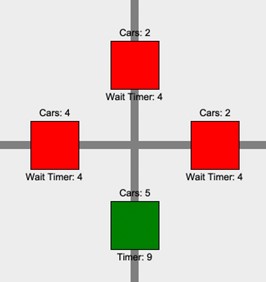 stuck at a traffic light for no reason, I realised many signals operate on fixed timers, causing unnecessary delays during off-peak hours. This led me to the idea of traffic signals that adjust based on real-time traffic flow, prioritising lanes with more cars. Unsure if the necessary sensors were available, I opted to code a simulation—both a practical and cost-effective solution. I showcased the concept at a junction, though it could be scaled to roundabouts and other intersections.
stuck at a traffic light for no reason, I realised many signals operate on fixed timers, causing unnecessary delays during off-peak hours. This led me to the idea of traffic signals that adjust based on real-time traffic flow, prioritising lanes with more cars. Unsure if the necessary sensors were available, I opted to code a simulation—both a practical and cost-effective solution. I showcased the concept at a junction, though it could be scaled to roundabouts and other intersections.
After refining my project, I completed a long application, highlighting my involvement in Mensa UK and my aspirations to study Computer Science at Cambridge, specialising in AI and Robotics. I then sat an online aptitude test covering structural and mechanical engineering, maths, and spatial awareness—though structural engineering proved challenging.
In early January, I was thrilled to learn that I, along with four others, had advanced to the interview stage. While nervous, as I had little interview experience, I prepared a short presentation for my interviewers. Despite some initial nerves (and a technical glitch), the interviewers were extremely supportive. I explained how my model ensured no signal remained red for more than 45 seconds, improving traffic efficiency and preventing unnecessarily annoyed drivers. They questioned its scalability and cost-effectiveness— two factors I had considered back in October. I talked about how the price of developing and creating the niche sensors required would be a big risk and investment for many governments which may not feel comfortable doing so. They also asked me to share my involvement in engineering beyond school, which led me to discuss my participation in the British Maths Olympiad and an engineering summer program at King’s College London Maths School.
The interview turned out to be a great learning experience rather than a stressful ordeal. Finally, in mid-March, four students, including myself, were awarded the scholarship. I was ecstatic—knowing how competitive this opportunity is— I’m excited to see what new doors it will open.
I would like to thank the school’s Physics department for presenting me with this opportunity, supporting, and guiding me through this process.
- Ananya
Isabelle's Story
Last year, I had the incredible opportunity to apply for an Arkwright Engineering Scholarship, a prestigious award designed to support future engineering leaders. The rigorous selection process involved a detailed application with a project, an aptitude test, and an interview. This scholarship provides invaluable insight into the engineering industry and potential career pathways. As a student hoping to study Computer Science or Aerospace Engineering, I realised this was a great opportunity for me.
For my project, I developed a 3D Gravitational Slingshot Simulator—a Python matplotlib simulation demonstrating the slingshot effect. I was inspired by the recent launch of the Europa Clipper, a spacecraft that harnesses gravitational assistance to study Jupiter’s moons. My goal was to deepen my understanding of this fascinating phenomenon. The project presented significant challenges; I encountered complex equations and mathematical notation that were completely new to me. Overcoming these obstacles required me to have perseverance and problem-solving skills. I submitted this project alongside my personal statement and predicted grades as part of my application.
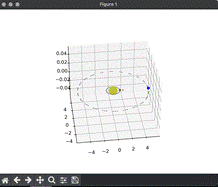
Despite not scoring as highly as I had hoped on the aptitude test, I was thrilled to receive an invitation for an interview! To prepare, I put together a presentation covering my project and broader engineering-related achievements. I reflected on my experiences at Kendrick School, including my participation in the UKMT Challenges, competitive programming platforms, personal coding projects, and my role as an RAF Cadet in the CCF.
During the interview, I was questioned by a software engineer and a physics specialist. They challenged me on aspects such as the scalability of my project and my leadership qualities. I discussed the skills I’ve developed through the CCF, my passion for engineering, and my personal growth over the past few years. Despite my initial nervousness, I found the interview engaging and rewarding. I walked out thinking, even if I’m not selected, this has been an incredible learning opportunity.
In mid-March, I was overjoyed to learn that I, along with a few other students, had been awarded the Arkwright Scholarship. All the effort, late nights, and determination paid off.
I’d like to express my gratitude to our school’s physics department! Their support and advice was invaluable, and we definitely could not have done this without them!
The biggest lesson I’ve taken from this journey? Seize every opportunity that comes your way - because the ones you don’t take might have been the ones to change everything.
- Isabelle
